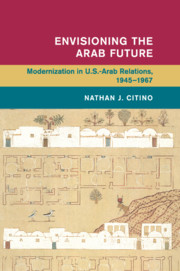32 results
12 - Gender, Domesticity and Speed: American Petro-modernity
-
-
- Book:
- Life Worlds of Middle Eastern Oil
- Published by:
- Edinburgh University Press
- Published online:
- 20 October 2023
- Print publication:
- 31 January 2023, pp 275-297
-
- Chapter
- Export citation
14 - Nasser, Hammarskjöld, and Middle East Development in Different Scales of Space and Time
- from Part IV - Development and International Society
-
-
- Book:
- The Development Century
- Published online:
- 03 September 2018
- Print publication:
- 06 September 2018, pp 283-304
-
- Chapter
- Export citation
Acknowledgments
-
- Book:
- Envisioning the Arab Future
- Published online:
- 02 March 2017
- Print publication:
- 17 February 2017, pp xiii-xiv
-
- Chapter
- Export citation
7 - Changing Course
-
- Book:
- Envisioning the Arab Future
- Published online:
- 02 March 2017
- Print publication:
- 17 February 2017, pp 251-285
-
- Chapter
- Export citation
Maps
-
- Book:
- Envisioning the Arab Future
- Published online:
- 02 March 2017
- Print publication:
- 17 February 2017, pp xi-xii
-
- Chapter
- Export citation
Abbreviations
-
- Book:
- Envisioning the Arab Future
- Published online:
- 02 March 2017
- Print publication:
- 17 February 2017, pp xvii-xvii
-
- Chapter
- Export citation
Index
-
- Book:
- Envisioning the Arab Future
- Published online:
- 02 March 2017
- Print publication:
- 17 February 2017, pp 317-326
-
- Chapter
- Export citation
Dedication
-
- Book:
- Envisioning the Arab Future
- Published online:
- 02 March 2017
- Print publication:
- 17 February 2017, pp vii-vii
-
- Chapter
- Export citation
5 - The People’s Court
-
- Book:
- Envisioning the Arab Future
- Published online:
- 02 March 2017
- Print publication:
- 17 February 2017, pp 177-211
-
- Chapter
- Export citation

Envisioning the Arab Future
- Modernization in US-Arab Relations, 1945–1967
-
- Published online:
- 02 March 2017
- Print publication:
- 17 February 2017
3 - City of the Future
-
- Book:
- Envisioning the Arab Future
- Published online:
- 02 March 2017
- Print publication:
- 17 February 2017, pp 97-141
-
- Chapter
- Export citation
4 - Yeoman Farmers
-
- Book:
- Envisioning the Arab Future
- Published online:
- 02 March 2017
- Print publication:
- 17 February 2017, pp 142-176
-
- Chapter
- Export citation
2 - Imperial Legacies
-
- Book:
- Envisioning the Arab Future
- Published online:
- 02 March 2017
- Print publication:
- 17 February 2017, pp 56-96
-
- Chapter
- Export citation
1 - The Age of Speed
-
- Book:
- Envisioning the Arab Future
- Published online:
- 02 March 2017
- Print publication:
- 17 February 2017, pp 15-55
-
- Chapter
- Export citation
Figures
-
- Book:
- Envisioning the Arab Future
- Published online:
- 02 March 2017
- Print publication:
- 17 February 2017, pp x-x
-
- Chapter
- Export citation
Introduction
-
- Book:
- Envisioning the Arab Future
- Published online:
- 02 March 2017
- Print publication:
- 17 February 2017, pp 1-14
-
- Chapter
- Export citation
Note on Transliteration and Translation
-
- Book:
- Envisioning the Arab Future
- Published online:
- 02 March 2017
- Print publication:
- 17 February 2017, pp xv-xvi
-
- Chapter
- Export citation
Conclusion
-
- Book:
- Envisioning the Arab Future
- Published online:
- 02 March 2017
- Print publication:
- 17 February 2017, pp 286-290
-
- Chapter
- Export citation
Dedication
-
- Book:
- Envisioning the Arab Future
- Published online:
- 02 March 2017
- Print publication:
- 17 February 2017, pp viii-viii
-
- Chapter
- Export citation
6 - The “New Men”
-
- Book:
- Envisioning the Arab Future
- Published online:
- 02 March 2017
- Print publication:
- 17 February 2017, pp 212-250
-
- Chapter
- Export citation



